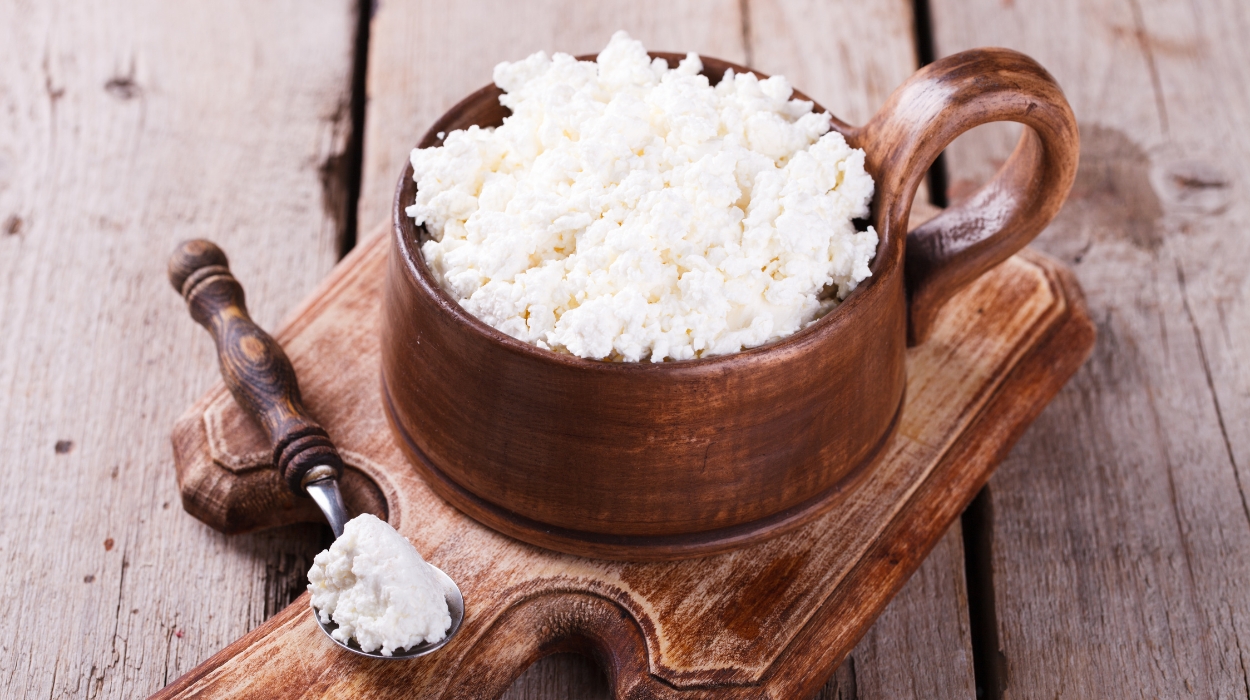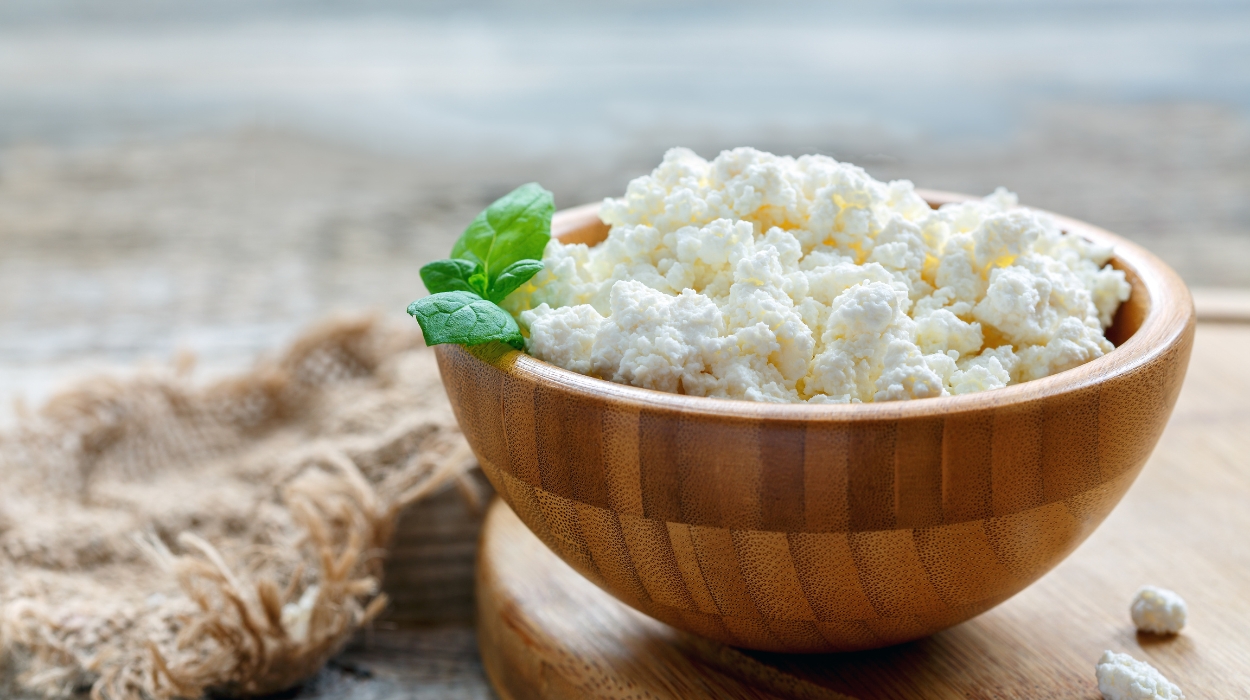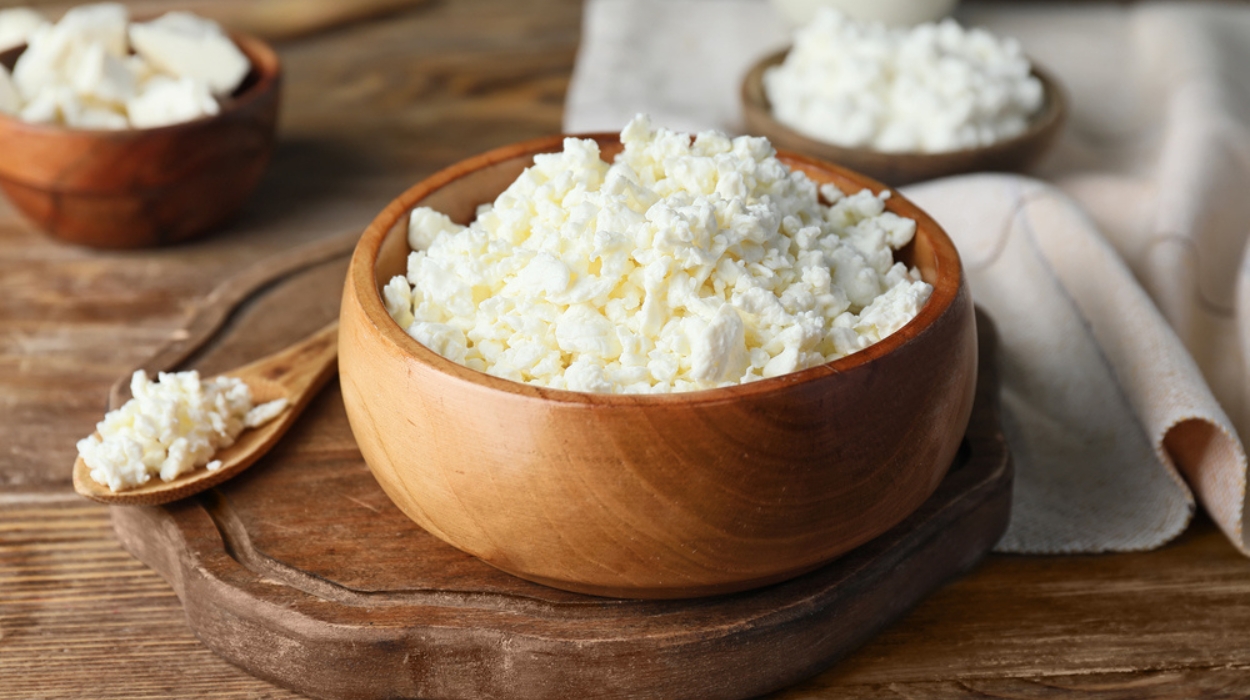The search for healthy foods to eat to lose weight is never-ending. These foods should strike a balance between being delicious and convenient and having great weight loss properties. With its creamy texture and versatility, cottage cheese often finds its way into discussions about weight loss-friendly foods, especially in meal replacement shakes for weight loss.
Packed with nutrients and low in calories, this cheese has sparked curiosity among health enthusiasts. But is cottage cheese good for weight loss beyond face level? Can you lose weight by eating cottage cheese?
In this article, we will delve into the nutritional profile of cottage cheese and examine how it can support weight management. Additionally, we will provide creative recipe ideas to incorporate this dairy delight into your weight loss journey.
Is Cottage Cheese Good For Losing Weight?
Cottage cheese is generally good for losing weight for a few reasons. For one, it’s high in protein, which can help you feel full and satisfied, potentially reducing overall calorie intake.
Additionally, it’s relatively low in calories compared to many other cheeses. However, it’s essential to consider portion sizes and the other foods you’re consuming alongside it. Moderation and balance are key in any weight loss plan.
Is Cottage Cheese Good For Weight Loss?

Cottage cheese has been a dietary staple for centuries. It is made from curdling milk from cows and contains a mild flavor and unique texture. Keep reading to understand why cottage cheese is good for weight loss.
Low-Calorie Option
Choosing low-fat or nonfat cottage cheese can significantly reduce calorie intake compared to full-fat versions. It also contains a few good fats for weight loss.
According to the Dietary Guidelines for Americans,[1] fats should make up 10% of our total daily calorie intake. So if you want to lose body fat, aim to eat 35-70g of fat per day to lose weight.
This substantial calorie difference makes it a smart choice for those aiming to trim down without sacrificing taste or satiety. Incorporating this lower-calorie option into various recipes or enjoying it as a standalone snack can help maintain a satisfying diet while promoting weight loss.
High Protein Content
When it comes to high-protein foods, cottage cheese holds its own. It boasts a high-quality protein profile, meaning it contains all the essential amino acids our bodies need. That also means it can aid in weight loss by promoting feelings of fullness[2] and reducing appetite.
The body expends more energy digesting protein compared to fats or carbs, which boosts metabolism and aids in burning more calories. Plus, cottage cheese is lower in fat and calories than other protein-rich foods like meats or legumes.
This makes it an excellent choice for weight-conscious individuals. So, if you’re looking for a delicious and nutritious way to support your weight loss goals, try cottage cheese.
Muscle Nourishment
The high protein content in cottage cheese isn’t just great for feeling full it also supports muscle tissue maintenance and growth. The protein found in cottage cheese contains essential amino acids crucial for repairing and building muscle tissue.[3]
This is particularly vital during weight loss because preserving muscle mass is key to sustaining a healthy metabolism as you burn body fat. Proteins in cottage cheese, notably casein, provide a sustained release of amino acids to muscles over an extended period.
This steady supply aids in preventing muscle breakdown[4] and fostering muscle repair to support growth. Moreover, muscle tissue demands more energy than fat tissue, so by maintaining or building muscle mass through protein intake from cottage cheese, your body naturally expends more calories even at rest.
Nutrient Richness
Beyond protein, cottage cheese contains essential nutrients[5] like calcium, phosphorus, and B vitamins. These contribute to other health benefits like bone health, energy metabolism, and overall well-being during weight loss, ensuring your body receives the necessary weight loss supplements even on a calorie deficit.
For example, calcium isn’t just for strong bones; it may also play a role in weight management. Studies suggest that calcium can help regulate body weight[6] by boosting metabolism and reducing fat absorption.
The Nutritional Value Of Cottage Cheese

So, is cottage cheese good for losing weight? Weight loss predominantly hinges on managing your calorie intake. The fundamental goal of weight loss involves consuming fewer calories than your body needs, allowing your body to burn fat reserves.
Calorie requirements for weight loss depend on factors like age, gender, physical build, and activity levels. Generally, as advised by the NHS,[7] women should aim for a daily intake of 2000 calories a day, while men should target 2500 calories a day.
However, for weight loss, this should be combined with at least 150 minutes of[8] moderate-intensity activity a week or 75 minutes of vigorous-intensity activity a week.
The calories in cottage cheese fluctuate based on the fat content. According to the USDA, a cup of full-fat cottage cheese contains around 208 calories,[9] while the nonfat variety clocks in at approximately 185 calories[10] per cup.
Here is the full nutritional content[10] of cottage cheese (low-fat version):
- Water: 178 grams.
- Calories: 185 grams.
- Carbohydrate: 9.48 grams.
- Protein: 24.2 grams.
- Fat: 5.06 grams.
- Calcium: 227 mg.
- Iron: 0.286 mg.
- Potassium: 264 mg.
- Zinc: 1.34 mg.
While cottage cheese might not be a major source of vitamins C and E, it still offers a range of B vitamins along with minerals like calcium, phosphorus, and selenium. The minerals are vital for bone health,[11] maintaining healthy teeth, and supporting antioxidant activities[12] in the body.
The B vitamins play essential roles in energy metabolism,[13] supporting the body’s ability to convert food into usable energy. Riboflavin aids in red blood cell production.
Vitamin B12 is crucial for nerve function and DNA synthesis,[14] while pantothenic acid synthesizes and metabolizes proteins, carbohydrates, and fats.
So, cottage cheese contributes to overall nutrient intake, especially in terms of B vitamins and minerals, making it a valuable addition to a balanced diet.
How To Enjoy Cottage Cheese For Weight Loss
Adding cottage cheese to your weight loss meal plan is as easy as pie. You can add it to your breakfast smoothie, use it as a topping for salads, or even enjoy it as a delicious snack with some fresh fruit. Here are a couple of ways to add cottage cheese, the best fat burner, to your savory dishes for weight loss:
Cottage Cheese Breakfast Recipes
Tired of the same old breakfast regimen? Add cottage cheese to the mix to wake your taste buds up. There are pancakes, smoothies, and omelets that you can top up with cottage cheese to give your breakfast and high-protein snacks an extra packed boost.
You can also top it with your favorite fruits, a splash of almond milk, and a handful of spinach for a creamy and nutritious meal that will keep you satisfied and on track with your weight loss goals. Here are some recipes:
Protein-Packed Smoothie Bowl
- Ingredients: Cottage cheese, frozen berries, banana, almond milk, chia seeds
- Method: Blend cottage cheese, berries, banana, and almond milk. Pour into a bowl, top with chia seeds, and add fruit for garnish.
Veggie Cottage Cheese Omelet
- Ingredients: Cottage cheese, eggs, spinach, bell peppers, onion, seasoning
- Method: Whisk eggs, fold in cottage cheese and veggies, cook as an omelet, and season to taste.
Cottage Cheese Pancakes
- Ingredients: Cottage cheese, eggs, oats, baking powder, vanilla extract
- Method: Blend ingredients, cook as pancakes, and serve with fresh fruit or a dollop of Greek yogurt.
Cottage Cheese Recipes For Main Dishes
Who says cottage cheese is just for breakfast or snacks? Spice things up by using cottage cheese as a protein-packed ingredient in savory main dishes. Whether it’s stuffed chicken breasts, lasagna, or even a flavorful dip, cottage cheese can add a creamy and delicious twist to your favorite recipes without sabotaging your weight loss efforts.
Creamy Cottage Cheese Pasta Sauce
- Ingredients: Cottage cheese, garlic, basil, spinach, parmesan cheese
- Method: Blend cottage cheese, garlic, and basil. Sauté spinach, add the blend, toss with cooked pasta, and top with Parmesan.
Cottage Cheese Stuffed Peppers
- Ingredients: Cottage cheese, bell peppers, tomatoes, onion, spices, shredded cheese
- Method: Mix cottage cheese with diced tomatoes, onion, and spices. Stuff into halved peppers, bake, and top with shredded cheese.
Conclusion
In conclusion, cottage cheese emerges as a weight-loss-friendly powerhouse with a myriad of benefits for those on a journey toward a healthier lifestyle. Its high protein content supports satiety, muscle maintenance, and a more efficient metabolism. Which cottage cheese is best for weight loss? Opting for low-fat or nonfat varieties ensures you get maximum satisfaction with a healthy diet.
Moreover, cottage cheese is a nutrient-rich addition to meals, supplying essential vitamins, minerals, and bone-strengthening components. Its versatility in recipes allows for enjoyable, creative ways to incorporate this dairy delight into daily menus.
While it’s not a magical solution for shedding pounds on its own, cottage cheese can undoubtedly be a valuable ally in a well-balanced, healthy diet. When combined with exercise and an overall healthy lifestyle, it can contribute to sustainable weight management.
Frequently Asked Questions
Cottage cheese, rich in protein and low in calories, aids weight loss by promoting fullness. However, spot reduction isn’t feasible; overall calorie control and exercise are key for losing belly fat.
Yes, consuming cottage cheese daily can be part of a balanced diet. It offers protein, calcium, and other nutrients. Moderation matters, considering overall dietary needs and potential lactose intolerance.
Absolutely. Opt for low-fat or nonfat versions to align with a low-fat diet. Cottage cheese provides protein, vitamins, and minerals while being relatively low in fat, making it a suitable choice.
Cottage cheese, high in casein protein, digests slowly and aids in muscle recovery. While it doesn’t directly burn fat, its slow digestion may support metabolism and prevent muscle breakdown during sleep.
 Evidence Based
Evidence Based
